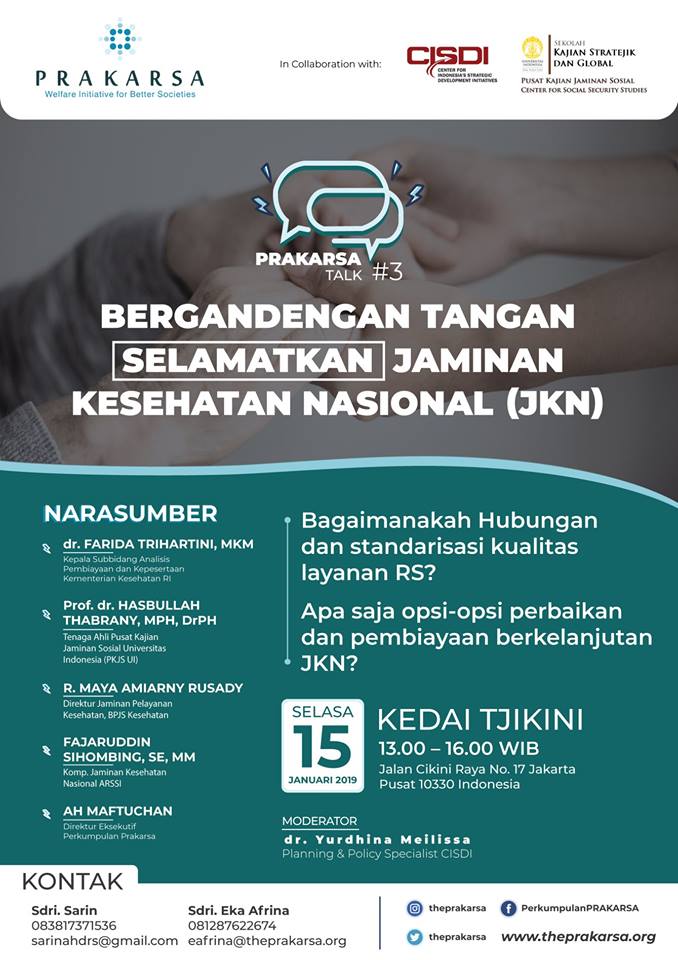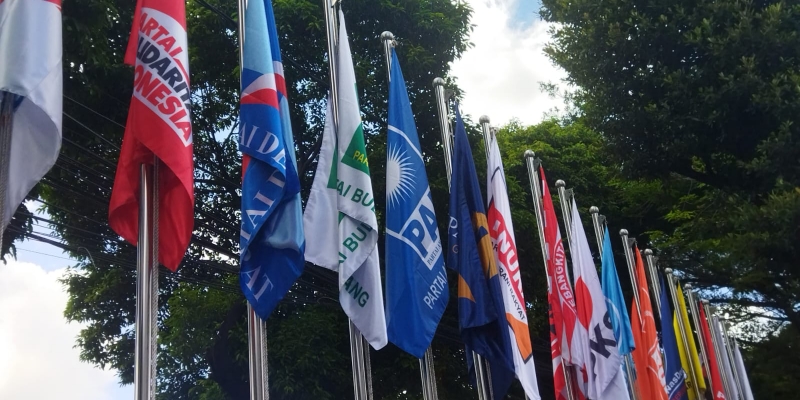
Based on BPJS Health data as of January 1, 2019, JKN membership has reached 215 million people or 81% of the total population of Indonesia. This achievement is still below the UHC 2019 participation target.
The implementation of JKN is also still plagued with various problems, including the deficit in the Social Security Fund managed by the Health Social Security Administration (BPJS), problems with access to services, and problems with the commitment of hospitals, doctors and health workers.
To increase wider community participation in finding solutions to problems encountered in the implementation of JKN, associations Prakarsa together with the Center for Indonesia's Strategic Development Initiatives (CISDI) and the Center for Social Security Studies (PKJS) UI will hold an interactive dialogue regarding the sustainability of the JKN program.
The Indonesian government has made efforts to accelerate the achievement of Universal Healthcare Coverage (UHC) through the National Health Insurance (JKN) program mandated by Law no. 40/2004 concerning the National Social Security System (SJSN). Based on BPJS Kesehatan data as of January 1 2019, JKN membership has reached 215 million people or 81% of Indonesia's total population. This achievement is still below the 2019 UHC participation target. In 2019, the government is targeting total participation to reach 95% or 257,5 million people in Indonesia which places JKN-KIS as one of the largest health insurance systems in the world. The implementation of JKN is also still plagued by various problems, including a deficit in the Social Security Fund managed by the Health Social Security Administrative Body (BPJS), problems with access to services, and problems with the commitment of hospitals, doctors and health workers. Research Prakarsa shows that 23% of JKN participants have complaints about hospital inpatient services on the grounds that rooms are always full and complaints against health workers, that is, more than 50% said doctors don't care.
In an effort to maintain the quality of services in hospitals, the government has made several rules regarding the criteria for hospitals that can provide JKN services. One of them is the Regulation of the Minister of Health Number 99 of 2015 concerning amendments to the Regulation of the Minister of Health Number 71 of 2013 concerning Health Services in the National Health Insurance which regulates accreditation as a mandatory requirement for hospitals in collaboration with BPJS Health. This requirement was then strengthened by Presidential Decree 82 of 2018 concerning Health Insurance. At the end of 2018, the Ministry of Health issued a letter from the Minister of Health Number HK.03.01/Menkes/768/2018 dated December 31, 2018 regarding the Extension of Hospital Cooperation with BPJS Health.
Based on the letter, on January 1, 2019 BPJS Kesehatan decided not to continue cooperation with a number of hospitals that were unable to show their accreditation certificates. The termination of this collaboration resulted in the temporary suspension of JKN services at these hospitals and caused unrest in the community. The unrest ended when the Minister of Health sent a letter number HK.03.01/Menkes/18/2019 dated January 3, 2019 regarding the Extension of Hospital Cooperation with BPJS Health. The letter recommends BPJS Health to continue the cooperation contract with the hospital even though it is not yet accredited.
This shows that the issue of quality and sustainability of JKN services does not only rely on BPJS Health alone but also on the Ministry of Health and health facilities as the spearhead of services for JKN participants. The commitment of all parties, starting from health facilities, BPJS health, DJSN, the Ministry of Health and the Provincial and District/City Health Offices is needed to maintain the sustainability of JKN implementation.
Regarding funding, the 2018 BPJS Health annual budget work plan (RKAT) cash flow showed a deficit of IDR 16,5 trillion. This figure continues to swell from the previously recorded deficit of Rp. 3,8 trillion (in 2014). This problem requires the participation of all parties in its resolution. However, this trend of BPJS Health's balance sheet deficit will be difficult to resolve as long as there is no transparency regarding the implementation of JKN. BPJS Health as the organizer and manager of the Social Security Fund is required to be more transparent and accountable.
Therefore, in order to increase wider community participation in finding solutions to problems encountered in the implementation of JKN, Associations Prakarsa together with the Center for Indonesia's Strategic Development Initiatives (CISDI) and the Center for Social Security Studies (PKJS) UI deemed it necessary to carry out an interactive dialogue with various parties, both the Ministry of Health, BPJS Health, Private Hospital Associations, CSOs, Academics, Media and the general public concerned Hospital accreditation issues and the impact of the Social Security Fund (DJS) deficit on the sustainability of the JKN program.
Download Full Tor here..



